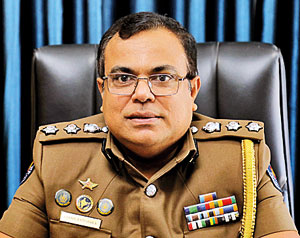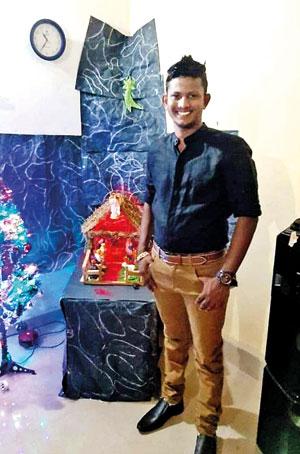News
Playing hooky with the law: Kudu Salindu’s case casts limelight on enforcing justice
View(s):By Ishu Bandara
Salindu Malshika Gunarathne, widely known as “Kudu Salindu” and allegedly linked to organised crime and drug trafficking, failed to appear before the Magistrate’s Court for the fifth consecutive time this week.

SSP Krishantha Ratnayake. Pic by M.A. Pushpa Kumara
On January 9, the Moratuwa Magistrate’s Court extended his open warrant during the proceedings of cases and accordingly two cases were postponed to January 23 and February 27, 2025.
Salindu was arrested in Madagascar on March 1, 2023, alongside his partner, Nadun Chinthaka Wickremaratne, known as “Harak Kata.” The arrest occurred at Ivato International Airport in Antananarivo, Madagascar, as they attempted to depart the country. The operation was a collaborative effort involving the National Central Bureau (NCB) of Interpol, Madagascar’s law enforcement authorities, and customs officials.
Following their arrest, the Criminal Investigation Department (CID) of Sri Lanka dispatched a team to Madagascar to facilitate their repatriation. On March 15, 2023, both Salindu and Nadun were brought back to Sri Lanka. Upon arrival, they were placed under a three-month detention order under the Prevention of Terrorism (Temporary Provisions) Act (PTA) to facilitate further interrogation.
After more than one and a half years in custody, Gunarathne was granted bail on December 19, 2024, in connection with his ongoing court case.
Despite being granted conditional bail in December,19, 2024, which required him to report to the CID every Sunday, Salindu failed to comply. His repeated absences prompted the court to issue an open warrant.
On the first Sunday following his release, which was on December 22, 2024, Salindu’s lawyers submitted a medical report issued by the medical officer of the Kalutara District, requesting a three day leave for the suspect. The lawyers also stated that their client’s was not in good health and unable to report to the court.

Salindu Malshika Gunarathne, widely known as “Kudu Salindu”
Senior Superintendent of Police (SSP) and Director of the Criminal Investigation Department (CID), Imesha Muthumala, told the Sunday Times, “We are continuing our investigation to apprehend him. We have already obtained a statement from the doctor who issued his medical report and are conducting further inquiries, as he has avoided appearing in court and disappeared after being granted bail”.
However, according to Salindu’s lawyers, “There is no specific legal provision in Sri Lankan law requiring a suspect to be physically present in court for every hearing. However, if there is a death threat against the suspect, ensuring their safety and appearance in court becomes a critical concern.”
“My client has received death threats from both some police officers and their opponents, making it unsafe for him to appear at the CID to provide his signature. Some police officers allegedly attempted to extort 130 million from Salindu's party, but they refused, and the matter was reported to the courts. Given these circumstances, my client is under threat from both certain police officers and other opponents,” Salindu’s lawyers told the Sunday Times.
Salindu’s case has been transferred to the CID from the Panadura Divisional Criminal Investigation Division for a more thorough and expedited investigation.
Salindu is required to appear for a total of 12 cases, eight cases at the Panadura Magistrate’s Court, two cases at the Moratuwa Magistrate’s Court, one at the Mathugama Magistrate’s Court, and another at the Colombo Magistrate’s Court.
An authorised officer in the security forces told the Sunday Times that in Indian law enforcement suspects are often detained until their cases are concluded. However, Sri Lankan law differs, as it is more democratic and treats suspects as innocent until proven guilty. As a result, bail is granted in accordance with the law.
“However, there should be a proper process in place to track individuals after they are released on bail. Without such measures, significant time and resources are wasted repeatedly locating and bringing suspects back to court,” he added.
He further stated, “Under the Prevention of Terrorism Ordinance, suspects could be detained for several years while awaiting trial. This provision kept Nadun Chinthaka Wickremaratne, known as ‘Harak Kata,’ in jail for an extended period. However, following the 2022 amendment of the act, the maximum detention period was reduced to one year.” 
He also explained that prosecution during this time period is challenging, as there are often multiple cases to be prosecuted at once.
Senior Superintendent of Police (SSP) of the Panadura Division, Chamil Krishantha Ratnayake, told the Sunday Times, “Court cases are mostly based on the balance of evidence, regardless of the condition of a suspect, whether a drug dealer, murderer, or high-ranking criminal”.
He further emphasised, “We are conducting special training and workshops for police officers on how to properly raid suspects, collect accurate evidence, and write B reports without errors. As police officers, we are provided with sufficient education on how to handle court cases, from lower ranks to higher positions. Specifically, OICs are given case management courses.”
“We are currently discussing this matter with the newly appointed Inspector General of Police (IGP) about implementing a tracking system for bail-out criminals to address the issue. The IGP is deeply concerned about it, as well as the President, and we are hopeful that we can implement a successful solution similar to those already in place in other countries. However, the challenge in Sri Lanka lies in how resourceful our criminals are in evading such systems” added SSP Rathnayake.
“Additionally, we need to establish a comprehensive CCTV system across the country to facilitate investigations. We are working to raise awareness among the business community and villagers, as Sri Lanka still lacks a proper nationwide CCTV system. As CCTV and mobile phone tracking are our main tracking methods, greater attention must be given to these systems. In Colombo, there is a suggestion to implement a widespread CCTV network, but it is essential that this system be expanded throughout the entire country to ensure the convenience of the investigative process” he said.
The suspect’s continued evasion has highlighted concerns over the enforcement of bail conditions and the need for robust monitoring mechanisms. Authorities have reiterated the importance of implementing effective tracking systems and expediting judicial processes to address such challenges and prevent suspects from exploiting weaknesses in the legal framework.
President Anura Kumara Dissanayake emphasised the need for coordinated efforts among all institutions to ensure effective law enforcement during a discussion held on Monday, January 6, 2025, at the Presidential Secretariat with the Attorney General and officials from the Attorney General’s Department, as part of the new government’s efforts to accelerate high-profile legal cases.
He highlighted the critical role of the Attorney General’s Department in restoring public trust in the judicial system and stressed the importance of addressing public concerns about political interference to rebuild confidence in the legal process, according to a statement issued by the President’s Media Division on Monday (6).
The best way to say that you found the home of your dreams is by finding it on Hitad.lk. We have listings for apartments for sale or rent in Sri Lanka, no matter what locale you're looking for! Whether you live in Colombo, Galle, Kandy, Matara, Jaffna and more - we've got them all!

